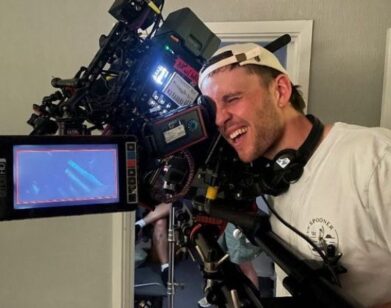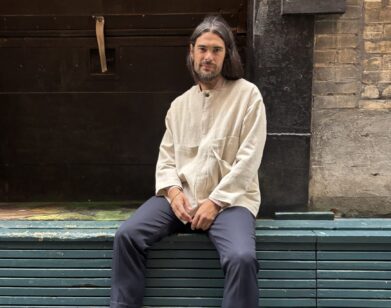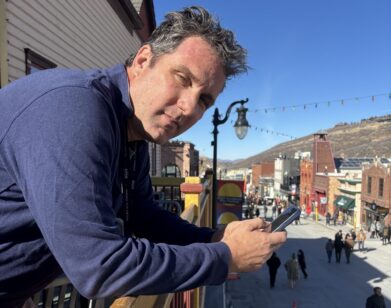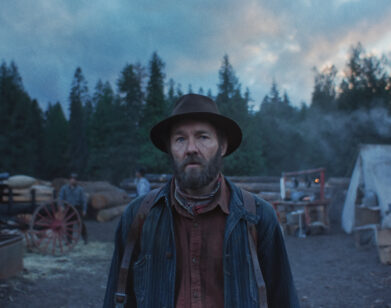TIFF
Another Dispatch from TIFF: Nomadland Has Big Oscar Energy

Chloé Zhao’s Nomadland is one of those films that dashes the festival circuit with a prewritten destiny attached. An official selection of Telluride, Venice, Toronto, and New York, this is the film the industry is pushing for Big Oscar Energy, and with good reason: it’s a classic American road movie with a moral sheen, a showcase for Zhao’s willingness to immerse herself into an off-the-grid culture as much as for her lucid, unblinking direction. But more than that, it’s a vehicle for the bulletproof Frances McDormand, one of the most compelling and amusing actors of her generation, who could probably read a Reddit thread out loud for two hours and millions of people would spectate without complaint.
The film chronicles a woman named Fern who takes seasonal gigs at Amazon fulfillment centers—just enough work to afford to keep her trusty van (nicknamed “Vanguard”) running from one rest stop to the next in her off months. Stubbornly independent to the point of alienation, Fern reluctantly joins up with a community of nomads at the behest of her friend, Linda May (playing herself), mostly retirees who’ve lost their pensions and prefer to set out for the great light on the horizon rather than capitulate to a life of endless work into the grave. We receive glimpses of backstory, and find out Fern was once married and her husband passed away. They had a house, somewhere, with a desert attached to it. Now she lives in her van which she’s built out with custom shelving. Her family doesn’t understand her lifestyle, and she seems cautious around new people.
Throughout, Zhao presents a bleak snapshot of American economics, in which communities are destroyed by corporate implosion, the only available jobs are on the assembly line for big tech, and the only freedom one can find is in the small pleasures to be wrung from owning nothing at all. Cinematographer Joshua James Richards, who also shot Zhao’s last film, The Rider, creates teeming life through his camera movements, which can sometimes feel like the eyeline of a gawker getting caught staring and eavesdropping for a bit too long. But if it weren’t for McDormand’s reliably note-perfect performance, it might have come off as formulaic: dropping great actors into real communities and letting them work their charms has become something of a new independent cliché, as pioneered in recent work from Sean Baker, Andrea Arnold, and Richard Linklater to name only a few. Even McDormand fits this formula all too well. And while I’m sure she’s never done anything like this, it had an unnerving feeling, like it made so much sense it felt like I’d seen it before.
I was much more surprised by, and taken with, Pieces of a Woman. The English-language debut of director Kornél Mundruczó and writer Kata Wéber (sharing a “film by” credit) lets you know that it’s about a tragedy during childbirth, and the impact that has upon a couple’s lives, which is all you need to white-knuckle through the first 30 minutes of the film, largely composed of a one-take labor sequence that I would easily describe as scarier than The Exorcist. It greets you like a warning shot declaring the arrival of an immense filmmaking talent, a bravura feat of directing, anchored by a trio of astonishing performances.

The couple are Martha and Sean (Vanessa Kirby and Shia LaBeouf). Their midwife gets stuck in another labor when Martha’s contractions advance and they are forced to deliver with an alternate, Eva (Molly Parker). Beginning a film with its central showstopper sequence is certainly a choice, in that it threatens to overshadow the rest of the story, but the fact that it doesn’t is a testament to Mundruczó and Wéber’s intelligence and audacity of honesty. Scarcely can I recall a film that deviated so unusually from the clichés I projected upon it going in. The twists and turns Sean and Martha’s story takes can feel as spontaneous and irrational as real life often can, everything emotionally earned by the magnetic and fiercely inhabited performances of its stars. In forgoing the typical backstory for the couple, we are left to observe finely nuanced and assuredly presented details that allow us to fill in the blanks, often finding ourselves blindsided by dynamics of class that are at once stereotypical and nevertheless ring true.
As Martha’s concerned yet bracing socialite mother Elizabeth, Ellen Burstyn spares no ounce of her legendary talent, presenting a glamorous but overbearing dose of Upper East Side social anxiety that climaxes with a roiling single-take monologue about surviving World War II as an infant. It’s the kind of speech that the great Estelle Harris might have played for laughs on an episode of Seinfeld. In Burstyn’s court, it smacks you with its piquant melodrama, telegraphing so many things at once that it amounts to a compelling stand-in for the narratives we spin our whole lives in order to find reasons to keep going. It’s no secret Shia LaBeouf is one of the most feral actors of his generation, and he continues to reach for the fences here, each boorish display (his word) of emotion hitting where it counts. But the glory most certainly belongs to Vanessa Kirby who arrives, in this role, as a formidable screen talent whose performance is so real, so exquisite, and so impactful that it almost doesn’t hit you until you think about it later.
And if you think that sounds intense, prepare for The New Corporation: The Unfortunately Necessary Sequel. Joel Bakan and Jennifer Abbott’s follow-up to the award-winning 2003 documentary The Corporation says it all with its title. The first film focused on how corporations became legally defined as persons and diagnosed them as psychopathic. The sequel ushers us through the years since to illustrate the ways in which a cadre of global megacorporations have operated a long con through which they bribe and lobby the government to deregulate and defund public programs, pay less money in taxes, then swoop in to market themselves as saviors in the communities they destroyed. Jamie Dimon of JP Morgan Chase is singled out for his charade in trying to rebuild Detroit as one ultimate example. We also monitor the rising rates of companies like Apple, Facebook, Pepsi, Unilever, and others, who are increasingly storing their profits in offshore tax havens to avoid taxation. Mythmaking through advertising is put under a microscope, and by the time we breeze through Occupy Wall Street and land at the Bernie Sanders campaign’s impact in 2016, it begins to feel like all is lost. While the movie retains a note of optimism at the end—the Sanders campaign inspired more than 7,000 supporters to run for office—it still leaves you feeling like it’s too little, too late.
That’s why we pivot to a gay romance by François Ozon to soothe our spirits. Été 85 (The Summer of ’85) begins with an arrest, a young man warns us of tale of death and romance, and we’re vaunted to the mid-1980s Normandy coast to the tune of “In Between Days” by The Cure. There’s not much to dislike about what Ozon has to offer in this vibrant cinematic message in a bottle: the majestic nonchalance of coastal France, a red hot Suzuki motorbike, painfully chic ’80s prep wardrobe design, a hint of murder, and the tragic romance at the center of it—all shot in beautiful Super 16mm.

We meet Alexis (Félix Lefebvre) who takes a sailboat out on his own only to promptly capsize it. He’s rescued by the 18-year-old David (Benjamin Boisin), whose easy smile and insistence on caring for Alexis is chivalrous if not over-the-top. Clearly he has other things on his mind. Over several days, David seduces Alexis, taking him to the cinema and around the countryside on his motorbike, driving recklessly, turning up home late, getting Alexis in trouble with his father, and hiring him to work at his family’s bait and tackle shop so they can fool around in the back when no one’s watching. Ozon’s framing of the relationship as a lead-up to David’s death casts an air of suspense that serves as a heartbreaking tension against the white-hot budding romance, as closely resonant of the real thrill as any I’ve seen on screen. This is due, in part, to the irresistible Boisin, who inhabits David with a fixated sense of mischief, the type that when focused on one person can cause permanent damage. Lefebvre telegraphs that euphoria and crash with tremendous empathy and character in a performance that feels like a breakout. The economic pacing of the storytelling and the long-promised final sequence, set to Rod Stewart’s “Sailing” on a Sony Walkman, keeps the film in a concise story frame that leaves you feeling bereft, like it could have been, or ought to have been, more. And yet you realize that’s the entire point. Both Lefebvre and Robert Smith told us from the start that it would end in tears.






